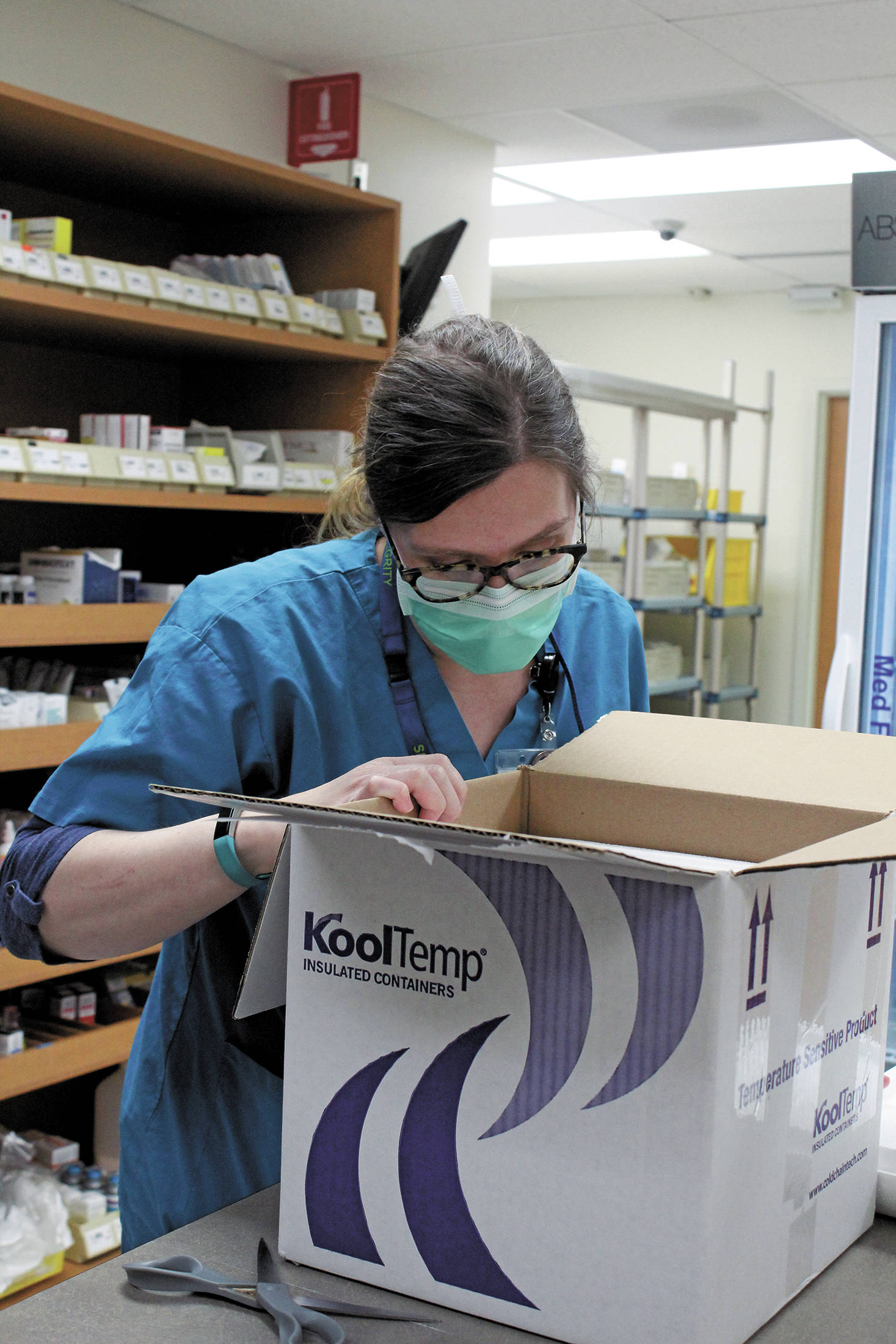They looked smaller than expected. That’s one of the thoughts that reverberated around the room of South Peninsula Hospital’s pharmacy as Jill Kort and Chelsea Dubbe unpacked Homer’s first shipment of the Pfizer COVID-19 vaccine on Wednesday night.
Two boxes — one carrying the much anticipated inoculations and another carrying the materials needed to administer it — were delivered to the hospital and carried to the pharmacy. Set on a high table among myriad other boxes, medications and equipment, they looked like any other medical supplies that one might expect in a hospital.
But pharmacists Kort and Dubbe conceded they’ve never been this excited to open a box before.
Peering into the box of vaccines, Kort removed several layers of shipping protection and insulation there to keep them at the desired low temperature. Then, she got a look at the little bottles themselves. After a few moments of examining them, a temperature monitor started beeping at the pharmacists, letting them know it was time to move the vaccines into the ultra cold storage they require.
In the other box came supplies to help administer the vaccine — things like needles, alcohol pads, disposable face shields and surgical masks. The hospital does have that equipment, but Public Information Officer Derotha Ferraro said it’s nice that they were sent with the vaccines so the hospital doesn’t have to draw down its own supply.
“It seems silly, but that’s so important,” she said. “That way we don’t have to use our supplies to do that. … Especially over time.”
South Peninsula Hospital received 180 doses of the vaccine on Wednesday, and is locked in to receive another shipment about three weeks from now in order to administer the required second dose, Ferraro said. After that, it’s less certain when the hospital can expect more shipments, and how many doses.
The vaccine made by Pfizer and BioNTech was given emergency use authorization by the U.S. Food and Drug Administration last week. Under emergency use authorization, the vaccine cannot be mandated yet by the government or private businesses.
Another company, Moderna, is on the cusp of receiving its emergency use authorization for its COVID-19 vaccine, but Ferraro said the hospital can’t be certain on a timeline.
The vaccines were administered to front-line health care staff at the hospital and residents of the Long Term Care facility starting at 7:30 a.m. Thursday morning. Family practice physician Christina Tuomi, D.O., was the first hospital employee to get the vaccine. She’s a physician at Homer Medical Center and is also the SPH Infection Prevention physician. Tuomi has been the hospital’s medical lead throughout the pandemic, Ferraro said.
The first Long Term Care resident to get the vaccine was Larry Young. By 10 a.m. Thursday, the hospital had administered 20 of its 180 doses, Ferraro wrote in an email. No adverse effects had been reported at that time.
People in Alaska who will be the first to receive the vaccine are front-line health care workers based in hospitals who are at the highest risk of being exposed to COVID-19, EMS and firefighters who provide medical services, residents of long-term care facilities, community health aides and practitioners, and those required to actually administer the vaccines.
Given the number of doses the hospital was given, Ferraro said not all front-line health care workers were able to get the vaccine this time around. That’s also because the hospital can’t give the vaccine to all front-line staff at once, because their work shifts need to be staggered. If a staff member were to have an adverse reaction or COVID-19-like symptoms after getting the vaccine, she explained, the hospitals protocols require that that worker stay home.
“You have to stagger it so you don’t impact the resources available,” Ferraro said.
While not all staff at the hospital can have the vaccine offered to them at this time, the entire staff of the Long Term Care wing are being offered the vaccine during this first round. It is not mandatory.
In addition to the roughly 60-70 employees at Long Term Care, all 17 residents were offered the vaccine starting Thursday, Ferraro said.
Across the U.S. and in Alaska, the Pfizer vaccine is still in a limited availability status, and it will be some time before it becomes widely available to the public. But Ferraro is cautiously optimistic.
“I hate to be so cliche, but you know, it’s the beginning of the end hopefully,” she said. “Hopefully that’s what it is. I think it helps reduce some fear, gives hope. … I think it reduces some fear with staff — the fear of getting ill themselves.”
For more information about the status of vaccines in Alaska, visit the state website dhss.alaska.gov/dph/Epi/id/Pages/COVID-19/.VaccineInfo.aspx#who.

